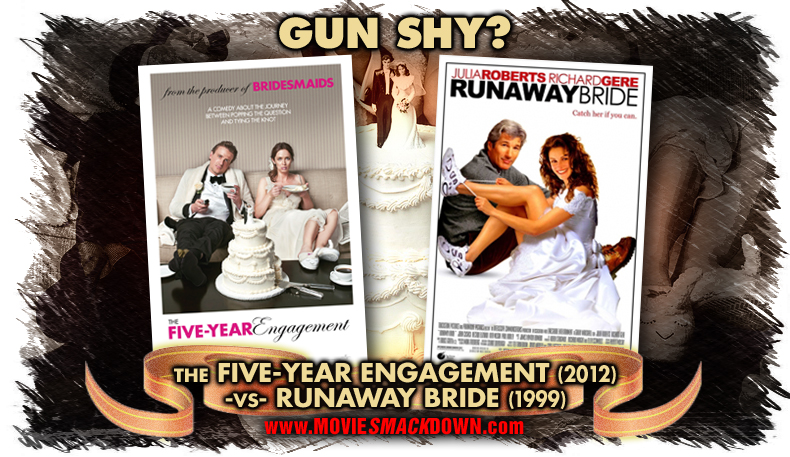
The Smackdown
Spring is a time of rebirth and new life, and what institution better embodies a new life than marriage? Well, probably divorce. Either way, spring is in the air here at Movie Smackdown, and we’ve got a major matrimony matchup to do battle—without even the benefit of a pre-nup.
The Challenger in this rom-com rampage is The Five-Year Engagement, premiering this weekend, with Jason Segel and Emily Blunt as the leads. In this new comedy from The Muppets writers Segel and Nick Stoller (who directed), and producer Judd Apatow, we follow a couple whose wedding keeps getting pushed back due to opportunities too good to pass up. Its opponent is Runaway Bride, which reunites Pretty Woman stars Julia Roberts and Richard Gere with director Garry Marshall in a tale of a woman notoriously known for fleeing multiple fiancés as wedding bells begin to chime.
Both contenders seem to be battling commitment issues before our match even starts, but we’ll see if they can overcome those hurdles in the Movie Smackdown arena. One movie bride goes through would-be grooms like chubby kids through wedding cake; the other stands by the guy she loves but can’t seem to schedule the bridal march. Love may have brought these two films to their knees, but one will land flat on its back, down for the count in our not-so-diamond-studded ring.
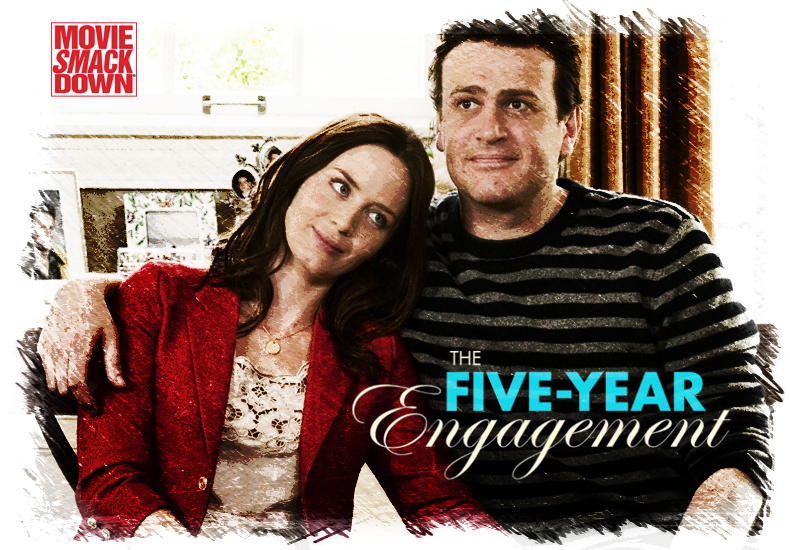 The Challenger
The Challenger
From the producers of breakout wedding comedy Bridesmaids comes The Five-Year Engagement, which picks up where most romantic comedies end. Tom Solomon (Segel) proposes to the love of his life, Violet Barnes (Blunt), but their walk down the aisle repeatedly gets postponed, as job opportunities, dreams and relationship problems block their path to the altar.
During a large portion of the movie, Tom plays the role traditionally portrayed by the woman in a relationship. He uproots his life and goes along with Violet when she lands her dream job in the psychology department of a university in Michigan and stays there for a number of years, despite hating generally everything about his new situation. In a typical romantic comedy, this resentment would probably be built up for comedic purposes, but here, Stoller and company decide to take the real world route, which can be plodding but is also something refreshing for the genre.
The movie features a cavalcade of sharp comedic performances from the likes of Rhys Ifans, Mindy Kaling, Brian Posehn and others, who benefit from the Apatow synergy and a funny script. Chris Pratt and Alison Brie shine in small roles, while Kevin Hart, Randall Park and Kaling add life to some otherwise dull academic scenes at the university. Watching Posehn’s standup bits fall flat on Sarah Silverman’s show years ago, I never thought I’d be praising his film work, but whoever let him out of his cage did so for a very good reason.
The movie’s realistic approach to depicting a modern relationship comes at the expense of its narrative drive. Still, even at his worst, Jason Segel puts a smile on my face, and that makes for an enjoyable movie-going experience every time. As both a writer and performer, the man just knows how to make an audience laugh. Segel and his strong supporting cast carry the film easily on the comedy front, no matter how thin the story. Â
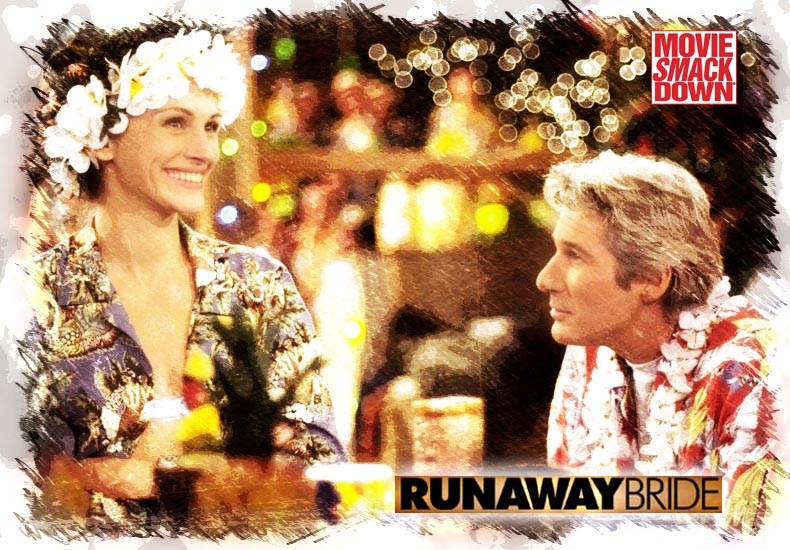 The Defending Champion
The Defending Champion
Runaway Bride follows New York City columnist Ike Graham (Gere) to Hale, Maryland as he finds Maggie Carpenter (Roberts), the woman dubbed the “Runaway Bride†after leaving three men at the altar. Ike had previously written a column about Maggie that got him fired due to factual errors supplied by a bitter, former fiancé of hers. As Ike now digs up new information for a second piece designed to get him his job back, he starts to fall for his subject. The timing is perfect, for a comedy anyway, seeing as how she’s just about to walk down the aisle with another suitor, making Ike the next in line to try his hand at finally getting the Runaway Bride to stop running.
The message here seems to be that before you can be a part of someone else’s life in a successful relationship, you have to first be true and happy with yourself. It also points out that one’s past doesn’t always define one’s future—something that must have become abundantly clear to the audiences who came to this film from the same stars and director who brought us the vastly more successful Pretty Woman.
Gere and Roberts still work well together, and Marshall keeps things humming, but the narrative shortcuts in this filmmake Pretty Woman’s wish-fulfillment play like a documentary. Here, the two leads end up together after a very short amount of time. (Five-year engagement? Try five minutes.) This despite their agreement that “attraction is often mistaken for rightness, and attraction does not mean anything.†The message comes off as contradictory, but it abides by the rules set forth in the world of this film, where anything goes, as long as it ends happily.
The Scorecard
For different reasons, both these movies make it hard to stay invested in their characters and their stories over rather long running times of about two hours each. Five-Year Engagement might have benefitted from fewer montages to show the passing of time, which as a viewer, I was already acutely aware of. Runaway Bride takes too long exploring the town and the characters in it. If Ike and Maggie had gotten together sooner, maybe their relationship at the end wouldn’t have to be so rushed.
Both movies have some very comedic moments, but their approaches to comedy differ greatly. Runaway Bride has more feel-good gags, like Maggie dying Ike’s hair when he first gets to town, whereas Engagement has funnier dialogue throughout. In other films, Jason Segel often falls back on loud, animated line delivery and has even resorted to full frontal nudity for a laugh. In this movie, he and Blunt are more deadpan. The outrageous things they say can be wildly funny, and the fact that they don’t sell it makes it even funnier. Bride’s humor is more gentle, which works too, but not as well by comparison.
The main difference in the two films is the style of storytelling. I appreciated The Five-Year Engagement’s realistic approach in theory, but in practice, it robs the plot of any urgency until late in the game. Usually, Segel and Stoller have pretty solid stories, but I guess everyone has their off days. Runaway Bride, on the other hand, has a pretty straightforward, if formulaic, plot and a sense of urgency that moves it along nicely, but never achieves the kind of laugh-out-loud dialogue that makes its rival so much fun.
The Decision
Neither of these films is a game-changer, but one can be counted on for the kind of laughs that a good cast can bring when fully engaged. For me, Garry Marshall’s comedy is sweet but old-fashioned and somewhat lifeless when compared with the energetic banter of The Five-Year Engagement. This latest offering from the Apatow factory has story problems for sure, but I laughed my ass off during almost every scene. For better or for worse, Jason Segel and company take the cake.




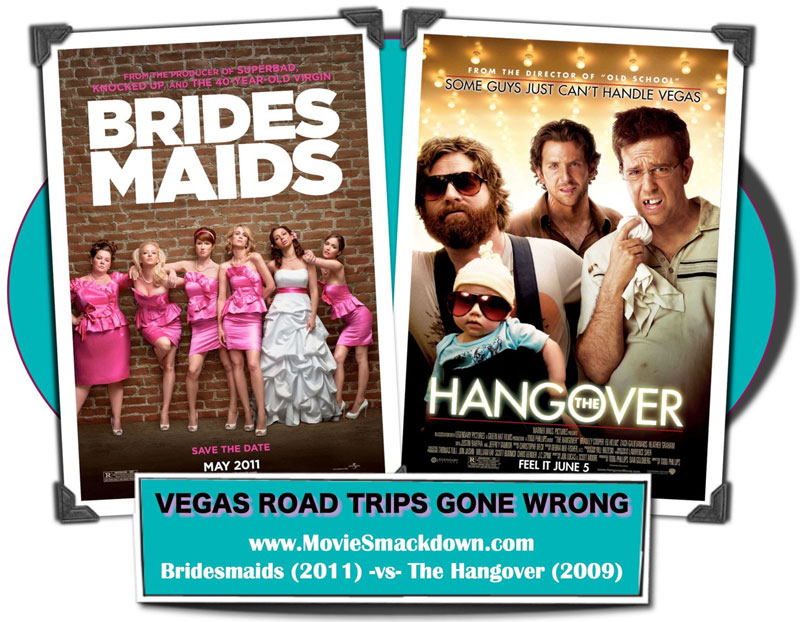

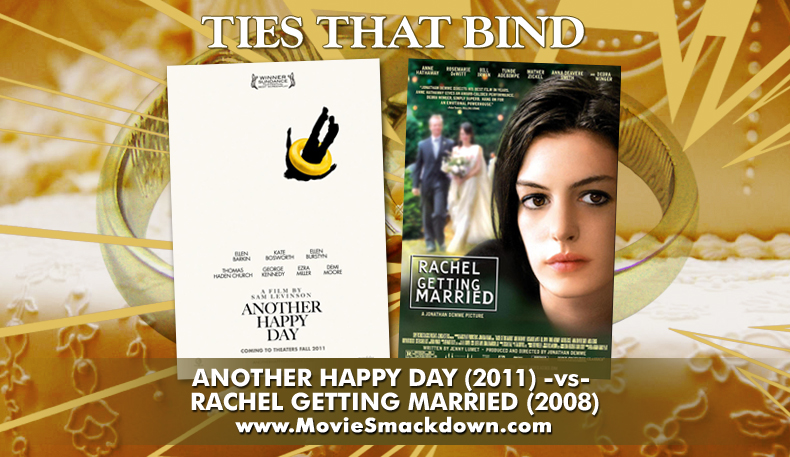
Do I like these movies? I do. (See? That wasn’t so hard, was it?)